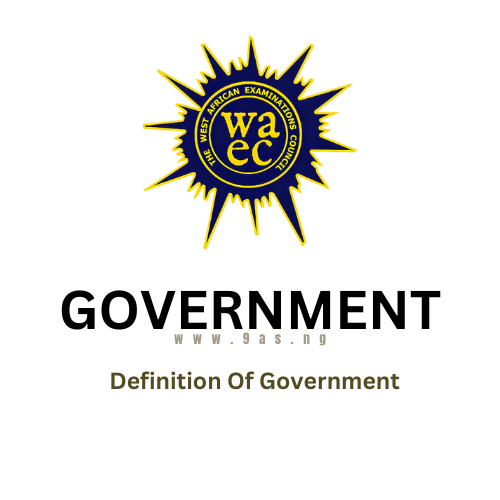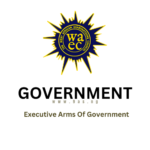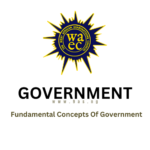THEORY
1. Discuss the importance of government as an institution of the state.
2. Explain what is meant by Government as an academic field of study.
3. Outline the basic functions performed by a modern government.
4. What is government as an academic field of study?
5. Define Government as an academic field of study.
6. Explain the term Government as an art of governing.
7. Why is Government important as an art of governing?
8. State six functions of government in a state.
9. Describe the term Government as an art of governing.
10. Highlight any four duties of government.
11. State five reasons for the study of government.
12. Explain five reasons for the study of government.
13. Identify five functions of government as an Agent of the state.
14. Highlight five factors that have contributed to the weakened government institutions in many West African States.
OBJECTIVES
1. The study of government is important because it
A. directs people’s attention to development of non-state institutions. B. enables citizens to understand the processes for managing state affairs. C. encourages individuals to take decisions that satisfy their aspirations. D. encourages the elite to remain in power.
2. Government refers to all the following, except
A. an institution of the state. B. the process of ruling political community. C. the exercise of power and authority. D. the act of civil disobedience.
3. Government as the act of governing means the
A. activities of pressure groups and political parties. B. act of vetoing a bill. C. orders of judiciary and legislature, D. activities by which government policies are made and implemented.
4. Which of the following is not the function of the government?
A. Building of roads, bridges, canals, etc. B. Provision of education. C. Maintenance of relations with other states. D. Provision of all the material needs of all citizens.
5. Which of the following is not a means by which government maintains law and order?
A. Law making. B. Maintenance of police and other security personnel. C. Provision of socio- economic services. D. Establishment of provisional associations.
6. In the process of governing, OUTPUT refers to
A. the influence of pressure group. B. demand of the political system. C. the decision of the government. D. the opinion of the electorate.
7. Government as an art of governing refers to the process of
A. ruling people in the society. B. establishing political parties. C. provide free education. D. acquiring social skills.
8. The functions of government include all the following except the
A, maintenance of peace and order. B. provision of social service. C. protection of citizens from malicious attack. D. provision of free medical services.
9. Government refers to all the following except
A. an academic field of study B. a process of making and enforcing laws. C. an institution made up of people with common interest. D. an organized group of people that formulate policies.
10. It is the duty of a government to perform all the following functions, except
A. preventing internal disorder. B. ensuring security of life and property. C. providing basic welfare services. D. providing all the needs of its citizens.
11. Government as an institution of a state can best be defined as a body that
A. recruits and trains political leaders. B. settles disputes and interprets laws for the state. C. legislates, executes and interprets laws for the state. D, conducts elections for the state.
12. As an academic field, the study of government does not include
A. Political economy. B. Comparative politics. C. Public administration. D. Ecological interaction.
13. Government is defined as an agency established to manage the affairs of
A. rulers. B. foreigners. C. the state. D. all workers.
14. A function of government is
A. controlling electoral mission. B. organizing pressure groups. C. making. D. forming political parties.
15. Government maintain law and order through the following except
A. police. B. immigration. C. the legislature. D. prison service.
16. Government is the machinery established to manage
A. rulers. B. aliens. C. the civil service. D. the state.
17. Government can be defined as the study of the affairs of
A. constitutions. B. cabinet system of government only. C. how people rule themselves. D. presidential system of government only.
18. Which of the following is not an acceptable function of government?
A. Defence. B. Subversion. C. Embarking on public enlightenment. D. Providing social amenities.
19. The study of Government offers an individual all the following, except a
A. knowledge of his rights and duties. B. training in good citizenship. C. knowledge of the processes of government. D. training to become a judge.
20. Which of the following is related to government as a process of governing?
A. Implementation and adjudication of laws. B. The role of pressure groups within the state. C. Disagreement between state and local governments. D. Abrogation of Fundamental Human Rights.
21. Which of the following is not an academic discipline in which a student of Government can specialize?
A. Public Administration. B. Local Government. C. Political Territory. D. International Relation.
22. Government as an institution of the state means
A. methods of organizing parties and pressure groups. B. process of decision-making in a society. C. methods of resolution of conflicts among the people. D. structure and systems for the decision-making in society.
23. All types of government perform all the following functions except
A. providing welfare and developmental facilities. B. maintaining law and order. C. encouraging the struggle for power. D. encouraging trade with other states.
24. In the study of government, public administration covers the
A. army, prison officers and the police force. B. civil service, public corporations and the local governments. C. ministries of education, health and agriculture. D. schools, hospitals and health centres.
24. Government as an academic field of study refers to the
A. president and his ministers. B. study of political institutions and processes. C. working of the organs of government. D. membership of international organizations.
26. The term government, refers to all the following except
A. an academic field of study. B. a process or art of governing. C. a process of making and enforcing laws in a state. D. an institution made up of persons with common interest.
27. The institution and processes connected with making, enforcing and reviewing of laws in any society is referred to as the A. Judiciary. B. Constitution Drafting Committee. C. Government. D. Bar Association.
28. Government can be described as the art of
A. making constitutions. B. collecting taxes. C. engineering social conflicts. D. making and enforcing laws.
29. Which of the following best defines government as an institution of a state?
A. An institution established for class struggle. B. Machinery established for exercising political power. C.A process of organizing societal values. D. The art through which political parties are managed.
30. Which of the following is a reason for studying government
A, Knowledge of the right of the individual. B. Acquisition of skills to work in a state- owned industry. C. Helps the individual to form a pressure group. D. Enables citizens to vote during elections.
31. Government as a process or art of governing means A. voting at general elections. B. orders of the judiciary and police. C. activities of political parties and pressure groups. D. activities for making and enforcing laws in a state.
32. Government can be made responsible and accountable to its citizens through the following methods except
A. periodic change of government. B. demonstration. C. political education. D. public opinion.
33. The primary function of government in a state is to
A. build schools and hospitals. B. provide transport service. C. engage in campaigns and rallies. D. maintain law and order.
34. Government as an institution of the state is defined as a body which A. conducts elections for the country B. makes, enforces and interprets laws for the state C. hires and trains political leaders. D. makes and interprets laws.
35. The study of government in school is important because the students can
A. be assisted by political leaders. B. learn about their rights. C. qualify for elections. D. be nominated for a trip abroad.
36. The primary function of government in a state is to
A. maintain law and order. B. provide transport services. C. engage in campaigns and rallies. D. imprison criminals.
37. Government as an institution of the state refers to the
A. police and armed forces. B. judiciary, the president and his ministers. C. legislature, the executive and the judiciary. D. economic and political institutions.
38. Government as a subject refers to the study of
A. territorial expansion. B. political leaders. C. the various nations of the World. D. the institutions of the state.
39. Government is distinguished from the State because it
A. can be changed periodically. B. does not operate in any defined territory, C. is a loosely organized structure. D. enforces its will on the people of the State.
40. A government performs the following functions except
A. safeguarding life and property. B. maintaining law and order. C. providing all the needs of its citizens D. providing basic welfare needs.
41. Which of the following best describes the subject matter of Government?
A. elections. B. people C. political party. D. political power.
42. The agency responsible for fulfilling the purpose of the state is
A. government. B. pressure group. C. public corporation. D. media.
43. In modern democracy, a government is A.
A contract between the rulers and the ruled. B. A preserve of the political party in power. C. Monopoly of the major ethnic group. D. Alternation of power between the majority and minority tribes.
44. The ability to make and enforce laws and administer justice constitute the major functions of a
A. Nation B. Society. C. Government. D. Pressure group.
45. The most important function of government is to ensure the A. building of offices B. judiciary is well resources. C. second arm of government is respected. D. security of the citizen.



